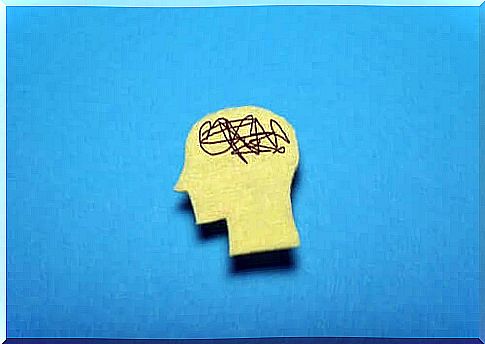The Importance Of Cognition In Psychopathology

The importance of cognition in psychopathology is enormous. In this sense, the presence and evolution of different cognitive factors is the variable that causes certain psychological conditions to appear or persist.
We talk about anxiety, sadness, guilt (emotions) or poorly adjusted and, therefore, inappropriate behaviors. Some people know how to recognize an anxiety attack, a self-injurious attack in depression or the rituals performed by a person with obsessive-compulsive disorder (OCD).
However, processes such as attention, reasoning, or memory occur differently in different types of psychological disorders. These processes are not the same in adapted people as they are in those with maladaptive behaviors that affect their daily lives. This does not mean that these processes will always be the same.
For example, just because people with OCD, Generalized Anxiety Disorder (GAD), or Post Traumatic Stress Disorder (PTSD) have grossly misaligned expectations doesn’t mean they always have or will have them. always.

Cognitive factors in psychopathology
The psychological processes that can be changed in different psychological disorders are:
- Memory
- The reasoning
- Thought
- Attention
- Perception
- Emotional regulation
Some of them are presented with illustrative examples referring to a wide variety of disorders. The objective will be to understand a little better the importance of cognitive factors in psychopathology.
Attention: excessive or defective
Attention is a process that illustrates very well the importance of cognition in psychopathology. This is a psychological process that shows an unsuitable pattern in people with psychological disorders.
This pattern is linked to hypervigilance. People with psychological disorders tend to pay more attention to stimuli that match their fears and concerns.
In the case of social phobia, for example, selective attention is paid to negative information and personal functioning. People suffering from social phobia are not only hypervigilant in the face of signals which may indicate that they are not welcome, but also in the face of their own bodily sensations (change of heart, breathing, etc.). It is self-attention.
Memory games
In the cognitive process of memory, many phenomena occur depending on the disorder we are talking about. Among them, we find:
- Selective memory : People with panic disorder, OCD, PTSD, GAD, mood disorders, or eating disorders tend to remember information consistent with their own fears, thereby validating it. Thus, a person suffering from a depressive disorder can remember information that proves that their family does not understand or support them. It thus eliminates memories that say the opposite
- Overgeneralized memory: Autobiographical memory can be used to recall in specific or overgenerationalized ways. In some mood disorders, ADD or PTSD can be vaguely and difficult to remember, then distorted
- Recurrent memory : in some cases of PTSD or panic disorder, the memorization process is beset by intrusive and unwanted memories of the traumatic situation
- Confidence in memory : In others, such as OCD, confidence in a memory that works well is lost, leading the person to have compulsions. An example would be not knowing if we have turned off the gas or locked the door.
Reasoning bias
Although we all have biases in our reasoning, the importance of cognition in psychopathology can be seen through much more extreme biases. Thus, one can find reasoning biases associated with several disorders, such as for example:
- Bias in interpreting ambiguous stimuli : in disorders such as GAD or mood disorders, we often tend to interpret ambiguous stimuli as negative. These stimuli can be gestures, changes in facial expression …
- Negative attributive style : this reasoning bias is typical of depressive disorders. The negative attributive style means that negative events that occur are from internal causes, which are stable and will not change. In psychotic disorders, a positive attribution style often appears. It is about the rejection of the responsibility on the other
- Probability Judgments : In some disorders there is a tendency to overestimate the likelihood of a harm happening. With its share of terrible consequences. It appears, as mentioned above, in phobias, OCD, GAD, PTSD, psychotic or depressive disorders
Psychopathology and the Traps of Thought
Ruminations, intrusions and worrying are elements that are often pronounced or intensified in association with a psychological disorder. The importance of cognition in psychopathology manifests itself in disorders such as OCD, where intrusions and recurring thoughts are potentiated. Not only that, but, in addition to appearing often, its intensity or power is greater.
In depressed people, it’s “ I’m not worth anything ”. In anxious people, it is “ they will stop loving me ”. On the other hand, in people with OCD, it will be “ I will be contaminated ”. Typically, people with psychological disorders overemphasize these thoughts until they take them for granted.
Thinking suppression, for example, is particularly problematic for people with obsessive-compulsive disorder. When you try to use your willpower on your own to avoid thinking about certain things, distracting yourself, or eliminating thoughts, you usually get the opposite effect.

Conclusions: the difficulty of change
Knowing the importance of cognition in psychopathology can make us realize how difficult change is if we don’t work on these elements. When designing an intervention for someone with OCD, it is important to understand that:
- There are cognitive factors that can help keep the problem going
- These cognitive loads can be an obstacle to the success of other measures of this intervention plan.
Thus, if a depressed person has a negative attribution style, it will be very difficult for him, in a routine of intertwining negative and positive events, to come out of his systematic error. Therefore, intervention led by a specialist is necessary.









